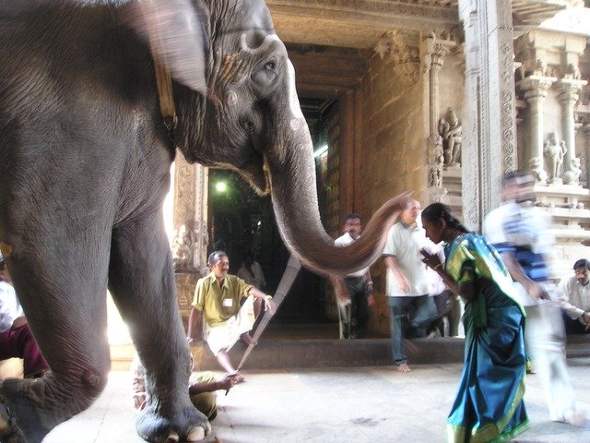 |
| Hinduism: culture, religious and spiritual values |
How culture, religion and spirituality help conserve biodiversity
Culture,
religion, and spirituality play an essential role in the preservation and protection of
natural resources and thus help conserve biodiversity.
There are several evidences
to prove that culture, religion and spirituality have helped
humans to preserve and protect forest, trees, animals, insects, birds,
fishes, habitats, ecosystem. etc. Here, we are trying to understand the
fundamental meaning of culture, religion, and spirituality and how it
helps conserve biodiversity.
What is culture?
Culture is nothing but the way of life of a
particular community or group of peoples, including their beliefs, behavior,
values and other manifestations of human
intellectual achievement. In short, culture is the traditional way of living life
for a particular group of people.
What is religion?
Religion is a specific system that gives direction to
faith and worship to control society by standardizing the culture. The religion
formed to control human behavior by establishing rules and regulations has
developed overtime to control and monitor culture.
What is spirituality?
Spirituality means consciousness, a deep sense of vitality
and an endless search for the truth of human life, its purpose and the depth of
the universe. The sense of awareness, understanding and recognition that you
are living for a specific purpose is spirituality. It is a means of connecting
our physical life and our physical world to something greater than human
knowledge which is not yet resolved by man.
Importance of culture, religion, and spirituality in biodiversity conserve
About 98% of the human
population represents cultural diversity. Each community has a unique culture,
beliefs, moral values, and religion, and they interact and maintain
relationships with the ecosystem they occupy. Most of the area rich in
biodiversity is generally occupied by these indigenous communities and,
therefore, we can say that around 23% of the world population lives in areas
sensitive to biodiversity.
All of these different
communities have their specific culture, regulated by their religion, and
establish tradition through their own institutions of knowledge about
terrestrial biodiversity. They support their culture by transferring traditions
from generation to generation.
Conservation of biodiversity
is an integral part of their tradition, belief and culture and therefore
becomes the way of life. Conservation areas like sacred forests are an integral
part of their homeland. Respect for their culture and religion that establish
tradition and way of lives, spirituality provides answers through in-depth
observations of natural resources, as well as systems to pass the knowledge
from one generation to next, makes it possible to conserve biodiversity and
natural resources.
Hinduism is the oldest
religion full of spiritual traditions and rich in cultural values teaches us
the concept of biodiversity conservation through the belief in the relationship
with the earth as a mother. In Hinduism, life evolves with the combination of
five elements such as earth, air, water, fire and space, therefore humans are
an integral part of this universe and each element is worshiped like a
divinity. It is truth that cultural and religious belief are more acceptable to
the communities than the legislation formulating by government or regulatory
bodies.
How culture helps to conserve biodiversity
Humans are social animals and
overtime developed various cultural values and practices to regulate their
lives. They formed communities in a specific territory, collecting, consuming,
and developing natural resources for their daily uses to survive and develop.
Many traditional practices follow to collect natural resources, which continue
to be an important tool for the conservation of biodiversity.
 |
| Hindu women worship trees |
Hinduism teaches us to live
in synchronization with nature and hence advises to respect every element of
nature, including plants and animals and thus promoting the conservation of
specific species by symbolizing them as cultural trades.
Humans have started to
harvest plants that are useful to them. They developed different harvesting
mechanisms for different plant species and thus became a mutual relationship
between them for sustainability. All these plant species are naturally
protected by humans and are part of their needs and culture.
Hindu Ayurveda is a medical
science and a gift to the world because it involves the use of nature,
especially plants, to heal wounds or heal diseases. Certain species of animals
or plants that are attached to a community have a particular affection for
them, and therefore once the species becomes rare or endangered, this community
quickly takes over.
Some Hindu communities limit
the consumption of animal meat and therefore their culture has developed in
such a way that
In Hinduism, Forest is
considered sacred and they believe it empowers his deities. The forest ecosystem
that inhabits various species and such beliefs of peoples contributes to
conserving biodiversity. In addition, it is surprising in Hinduism that cutting
green trees on stands is against God and therefore discouraged. Even before
harvesting medicinal plants, although it is to cure diseases, the plants are
worshiped and special rituals are performed before and after harvest in their
natural habitat.
How Religion helps to conserve biodiversity
Religion is the system that
regulates the community by its feelings, traditions and beliefs and that is
used to conserve nature. Many religious activities and rituals include the use
of medicinal herbs to create a more pleasant environment.
Many religious thoughts tell
us that every species, including animals, plants, insects, fish, and humans,
has a soul and therefore must be respected.
Certain animal and plant
species are used as religious symbols and therefore these species have special
protection from this community. It certainly helps preserve and protect this
species and it grows well. However, the species that does not represent any
religious symbol, its survival is in danger and may fall into the category of
threatened species. Therefore, religion can help conserve endangered species by
adopting it as its religious or cult symbol.
In Hindu religious rituals,
certain species of animals or plants are considered a god or a goddess, this
belief system in religion forced the community to respect biodiversity,
including habitats such as forests and rivers.
 |
| Hindu woman worship cow |
There are special rules and
respect has been established among Ayurveda Hindus to preserve and protect
certain plant species used for medicinal purposes. It certainly helps conserve
these species and respect nature. A respectful thought worshiped many species of
medicinal plants before their harvest in the wild. Many species of plants used
for medicinal purposes identified in Ayurveda and these species used in
religious rituals are worshiped as a symbol of gods and goddesses.
Consequently, it develops the general respect and fear of religious communities
towards the over-exploitation of these plant species.
All these religious beliefs
in the community help conserve the natural resource useful for its
sustainability. In some religions such as Hinduism, certain plant species are
related to Lord Shiva (powerful Hindu god) and there is a belief that Shiva
residing in this species, therefore, peoples began to care about these
important useful species. he began to respect, pray and avoid their
destruction. This belief and this thought of religion can be used as a tool for
the conservation of biodiversity.
Such feelings, beliefs and a
sense of belonging to nature can be created by performing different rituals to
protect our mother earth.
In Hindus, not only living
species are important and related to God, but also non-living beings like
rivers, forests, mountains, oceans, lakes, water, air and land represent
various gods and goddesses, which helps preserve him. giving respect.
 |
| Hindu peoples worship Ox |
In Hinduism, there are
various concepts of gods and goddesses. Everything that benefits humans is
represented or recognized as a god, for example, rain is good for farmers, so
there is a concept of God of rain (Lord Indra) and all farmers worship God
Indra. Mountains like the Himalayas protect the community living in India,
therefore, in India, there is God as Lord Himalaya, because of this concept,
people worship all species, including the forest in the Himalaya chain. River
like Ganga, Narmada, Saraswathi, Tapi, Godavari, etc. The whole name of Goddess,
therefore, all these rivers are sacred rivers for Hindus, so people respect and
pray all rivers. Certain animal species such as Monkey, Lion, Tiger, Cow,
Taurus, etc. They represent links with certain gods and goddesses; therefore,
people respect and adore all these animals.
Most medicinal herbs in India
have multiple values that have led
people to bond with religion to protect them from overuse.
The Bhagavat Gita is a holy
book of Hinduism that preaches that conservation and the worship of nature are
the important moral obligations of all humanity. Therefore, various species of
trees and animals are symbolized with God for people to respect and adore, this
helps conserve nature and biodiversity.
Even today, Hindus light a
lamp in their houses and temples in front of certain plants like basil. Some
Hindus do not eat without putting a basil leaf on cooked food that is sacred to
them. There are various sacred trees like Ficus religiosa (Peepal tree), Neem,
Banyan, Seneca indica and many others in Hinduism and they worship them. This
helps to conserve these species.
How spirituality helps to conserve biodiversity
Spirituality means awareness,
a deep sense of vitality, the sense of awareness, understanding and recognition
that you are living for a specific purpose and connecting our physical life and
our physical world with something greater than knowledge. Spiritual peoples
respect and consider all species have soul and thus he must respect all living
organisms. They give equal values and
respect living and non-living beings. So, biodiversity is the varieties of life
on earth that live in different ecosystems / habitats and are interconnected
with each other.
Spirituality helps remind
people that existence is associated with all these living and non-living beings
and that they must respect and preserve it for their existence and the survival
of the earth. In spirituality, you are not limited to the earth, but you
connect with the universe and try to find the answer for your existence, your
life purpose and how to serve mother earth.
Spirituality makes people
kinder and more responsible, begins to think about nature, begins to believe in
reality. Therefore, spirituality has rebuilt the human mind for positive
thinking and if that spirit worships certain trees, it will grow to protect
entire forests.
 |
| Basil plan is holy for Hindus |
The concept of spirituality
practiced by Hindus has made people aware of the energy they get from the sun
and that is why they represent the sun, it is the supreme god who cares about
mother earth. The sun is the main source of energy for all living organisms and
each organism has feelings because the soul exists in all living organisms.
This concept is the basis for connecting many species of flowers, trees,
animals, even lifeless things like rivers, mountains, rocks, etc. with spirituality
and were worshiped by the Hindus to thank them.
Conclusion
Due to modern lifestyles and
urbanization, people disconnect from nature day by day and forget their
traditional culture, become liberal in religious rituals, and withdraw from
human spiritual ties to the natural world. But culture, religion and
spirituality change and influence the basic values of human beings, which helps to conserve biodiversity.
Related Article
You may find affiliate
links in this article. This means that if you click on a link and purchase any
of the products on this page, we may receive a commission, at no additional
cost to you, It does not affect our knowledge sharing, opinions or reviews. Everything
we do is benefit for you as the reader, so all our knowledge sharing, reviews
are as honest and unbiased as possible.






0 Comments
Please don't add links in the comments, they will be treated as spam comments